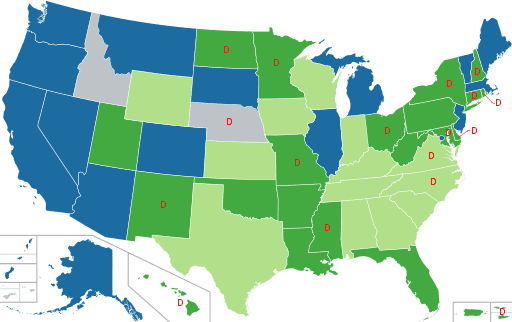Eight years after Colorado and Washington ended prohibition, recreational weed is legal in a third of the United States. Which is indeed cause for celebration! Especially when one considers that three out of four of these new recreational states usually swing red. In a time of great divisiveness, the right to smoke pot appears to have become a nonpartisan issue.
And it’s heartening to see that the new legislation reflects what we’ve learned. Three out of four of these laws have provisions to help citizens expunge cannabis convictions, and two states will be making room for equity applicants from day one. But many details remain mysterious and/or problematic. Let’s take a look at each state.

The Garden State for real this time
The citizens (66.9%) of New Jersey gave a resounding yes to Question 1, the legislatively referred constitutional amendment that will make cannabis legal in the Garden State. So what will the recreational regulations be like in New Jersey? That remains a mystery. Question 1 doesn’t set provisions for how much weed a person can legally possess, or whether the denizens of New Jersey will be able to grow their own. The rest of the details are left to be determined by Legislature and a five member Cannabis Regulatory Commission, which so far only has one appointee.
What we do know so far:
Cannabis becomes officially legal on New Year’s Day, 2021.
When stores open, there will be a 6.6% sales tax, with the option for municipalities to add an additional 2% tax.
Question 1 calls for the creation of an online portal that will help people initiate the process of expunging their records of cannabis convictions. The amendment also requires pending cannabis charges to be downgraded or dismissed.
When it comes to actually establishing a legal market, State Senator Nicolas Scutari is optimistic that the process won’t be as slow as it has been in some states. And it sounds like he actually has a plan. “We’re anticipating moving very quickly with enabling legislation which would in fact allow medical marijuana shops to sell to the general public immediately,” Senator Scutari told The New York Times. “We’re happy to invite New York residents over to enjoy.”
Further implications: New Jersey is expected to be one of the country’s largest markets, which may be the incentive Gov. Andrew M. Cuomo and tax-hungry lawmakers need to finally push through legislation in New York.
Legal weed in Montana
In Montana, the approval for recreational cannabis wasn’t quite as overwhelming as in New Jersey, but Initiative 190 passed with a healthy 57% of the votes. I’m sure there will be unforeseen complications and complaints, but 190 looks pretty good for both recreational consumers and existing medical operations.
What we know so far:
On New Year’s Day 2021, it will be legal for adults 21+ to light a jay.
The tax rate is high (20%)!
Adults may possess up to an ounce of cannabis flower and up to eight grams of cannabis concentrates.
There’s a grow-your-own provision of four plants per person and eight plants per household. Good for you Montana!
People with nonviolent cannabis convictions can apply to have their sentences reduced and/or their records expunged.
The future of recreational pot shops is less certain. To help the state’s medical providers gain a foothold in the recreational retail market, Initiative 190 institutes a one-year moratorium on new licenses for out-of-state companies.
Legal weed in Arizona
Proposition 207 passed with 60% of the vote, but it’s unclear when Arizonans will be able to legally light up. The legislation requires that additional regulations be established by April 5, 2021, at which point adult-use retail licenses must be available.
What we do know:
Most of the adult use licenses will be set aside for Arizona’s 130 medical dispensaries, though 26 licenses will be added for social equity applicants, and a few additional licenses will be handed out in counties that don’t currently have more than one dispensary.
In addition to Arizona’s normal 5.6% sales tax, recreational cannabis products will be subject to a 16% excise tax.
People will be allowed to possess up to an ounce of cannabis and grow six plants for personal use.
Expungement will be an option by next summer. The proposition has even allocated funds that will support community organizations that will help Arizonans get their records cleared.
Legal weed in South Dakota
South Dakota is the first state to legalize medical and recreational cannabis in tandem. Recreational (Constitutional Amendment A) was approved by 54.2 percent of voters, while 69% said yes to medical Initiative 26. South Dakota’s recreational legislation is less progressive than the other three states, but it has strong points.
Here’s what we know so far:
It will be legal to possess up to an ounce of weed.
The measure authorized the Department of Revenue to create four licenses types: for commercial cultivators; for testing facilities; for wholesalers to package, process, and distribute to retail sales outlets; and licenses for retail stores to sell cannabis.
Amendment A directed the Department to issue “enough licenses to substantially reduce the illicit production and sale of marijuana throughout the state” and, if necessary, limit licenses “to prevent an undue concentration of licenses in any one municipality.”
The tax rate is set at 15%.
Individuals who live in a jurisdiction with no licensed retail stores can grow up to three cannabis plants.
The constitutional amendment that will make recreational cannabis legal does not address expungement or a program to encourage equity applicants.
Further implications:
In the words of NORML Executive Director Erik Altieri:
“No state has ever moved from marijuana prohibition to allowing both medical use and adult-use access, quite literally, overnight. These votes are a stunning rebuke to those elected officials that for decades have refused to move forward with substantive marijuana law reform legislation, and they are yet another indication of the near-universal popularity of these policy changes among voters in all regions of the United States.”




